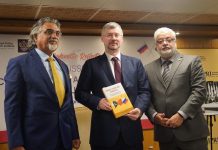ISLAMABAD, JUN 5 (DNA) – Advisor to the Prime Minister on Climate Change, Malik Amin Aslam, has said that the year 2020 has brought shocking surprises to the entire world and the most pertinent lesson that need to learn from the crisis posed by COVID-19 is that healthy human life is not possible without keeping our biodiversity and natural habitats intact.
He was speaking at an online dialogue ‘World Environment Day Time for Nature’ organized by the Sustainable Development Policy Institute (SDPI), here on the occasion of World Environment Day on Friday.
He said that the government has taken a number of initiatives, including the Green Stimulus Package to encourage environment-friendly development.
During the time of restricted human activities due to the pandemic, the adviser said, nature has shown remarkable ability to bounce back, therefore, we need to carry out the development activities in a sustainable manner.
“The economic situation has resulted in slowing down of institutional structures development and a lot of resources are required to get these materialized,” Mr Aslam said and added that his ministry is pursuing these goals despite challenges and using alternate mechanisms to achieve the desired results.
Mr Shafqat Kakakhel, the former ambassador and Chairperson of SDPI Board of Governors, presenting an overview of the situation regarding conservation of nature and biodiversity, said the basic purpose of the World Environment Day is to enable the international community, member states, international organizations, business sector and all other stakeholders to reflect on the theme chosen for celebration with this year’s theme being biodiversity. He said that the governments in South Asia have the weakest record of conserving the nature, which is an institutional failure. The Climate Change Bill 2017 is a comprehensive policy document and progress should be made on the actions that it suggests, he added.
Ms Aisha Khan, Executive Director, Mountain & Glacier Protection Organization (MGPO) and Civil Society Coalition for Climate Change (CSCCC), was of view that communities at the grass roots level need to be made the part of decision-making, especially on the local level policy implementations concerning their lives and livelihoods. She said that inclusion of women in the consultation and decision-making is equally important.
Mr Hammad Naqi Khan, Director General, World Wildlife Foundation (WWF), said that Covid19 has given us an opportunity to look at nature, biodiversity and all environmental issues in a holistic manner. He said that the cooperation between Centre and provinces need to be strengthened to improve the implementation on the National Conservation Policy. “We need to bridge the gaps where the government lacks the capacity and skills,” he said, adding that there are a few things that can be implemented with just a stroke of a pen and do not need any resources such as the categorization of water bodies in terms of quality.
Mr Mahmood Cheema, the Country Representative, International Union for Conservation of Nature (IUCN), while highlighting the issues pertaining to conservation of biodiversity and natural habitats, said that we have good policies but the implementation is the area where we actually are lacking. He said many of the departments with good mandate are resourceless and thus ineffective.
He stressed the need for a collaborated effort to start working on management plans for protected areas with the help of provincial departments, local communities and all other stakeholders followed by a strategy for effective implementation.
Earlier, SDPI Research Fellow Dr Imran Khalid highlighted the importance of marking World Environment Day and said that the theme for the current year has a special significance at the time when the people across the world are going through the unprecedented challenge posed by the pandemic.











